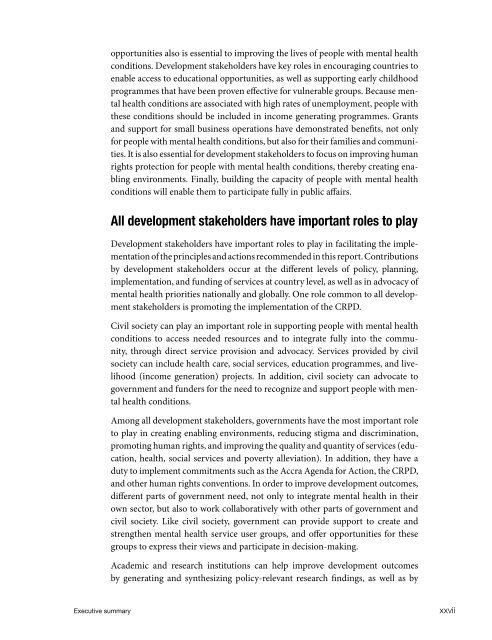MENTAL HEALTH AND DEVELOPMENT: - libdoc.who.int - World ...
MENTAL HEALTH AND DEVELOPMENT: - libdoc.who.int - World ...
MENTAL HEALTH AND DEVELOPMENT: - libdoc.who.int - World ...
Create successful ePaper yourself
Turn your PDF publications into a flip-book with our unique Google optimized e-Paper software.
Executivesummary<br />
opportunities also is essential to improving the lives of people with mental health<br />
conditions. Development stakeholders have key roles in encouraging countries to<br />
enable access to educational opportunities, as well as supporting early childhood<br />
programmes that have been proven effective for vulnerable groups. Because mental<br />
health conditions are associated with high rates of unemployment, people with<br />
these conditions should be included in income generating programmes. Grants<br />
and support for small business operations have demonstrated benefits, not only<br />
for people with mental health conditions, but also for their families and communities.<br />
It is also essential for development stakeholders to focus on improving human<br />
rights protection for people with mental health conditions, thereby creating enabling<br />
environments. Finally, building the capacity of people with mental health<br />
conditions will enable them to participate fully in public affairs.<br />
All development stakeholders have important roles to play<br />
Development stakeholders have important roles to play in facilitating the implementation<br />
of the principles and actions recommended in this report. Contributions<br />
by development stakeholders occur at the different levels of policy, planning,<br />
implementation, and funding of services at country level, as well as in advocacy of<br />
mental health priorities nationally and globally. One role common to all development<br />
stakeholders is promoting the implementation of the CRPD.<br />
Civil society can play an important role in supporting people with mental health<br />
conditions to access needed resources and to <strong>int</strong>egrate fully <strong>int</strong>o the community,<br />
through direct service provision and advocacy. Services provided by civil<br />
society can include health care, social services, education programmes, and livelihood<br />
(income generation) projects. In addition, civil society can advocate to<br />
government and funders for the need to recognize and support people with mental<br />
health conditions.<br />
Among all development stakeholders, governments have the most important role<br />
to play in creating enabling environments, reducing stigma and discrimination,<br />
promoting human rights, and improving the quality and quantity of services (education,<br />
health, social services and poverty alleviation). In addition, they have a<br />
duty to implement commitments such as the Accra Agenda for Action, the CRPD,<br />
and other human rights conventions. In order to improve development outcomes,<br />
different parts of government need, not only to <strong>int</strong>egrate mental health in their<br />
own sector, but also to work collaboratively with other parts of government and<br />
civil society. Like civil society, government can provide support to create and<br />
strengthen mental health service user groups, and offer opportunities for these<br />
groups to express their views and participate in decision-making.<br />
Academic and research institutions can help improve development outcomes<br />
by generating and synthesizing policy-relevant research findings, as well as by<br />
xxvii

















